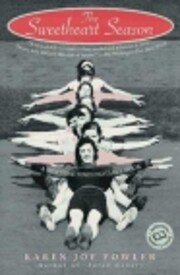

Cliquer sur une vignette pour aller sur Google Books.
|
Chargement... The Sweetheart Season (1996)par Karen Joy Fowler
 Aucun Actuellement, il n'y a pas de discussions au sujet de ce livre.   ) )Wow. You can read this as if it's just another beach read, but it's so much more. A comparison is made to Garrison Keillor, and it does have that empathy for a small town in heartland USA several decades ago. And it has that cozy humor. But it also has lots of provocative social commentary if you want to pay attention to it. I just loved it and want more. I've already ordered her short story collections to add to Mt. TBR. So what exactly is this book about? It's set after the Second World War in the small town of Magrit whisch is home to a cereal mill which turns out America's most popular breakfast cereal and produces one of America's most popular housekeeping magazines, all presided over by the fictional construct that is Maggie Collins. The young women work together in the scientific kitchen, experimenting with recipes and housekeeping tips and putting a nickel in the jar every time they refer to Maggie as something other than a real person. There are no young men in Magrit. None of them came back after the war. They weren't killed, they just never came back, and the marriage prospects for these young women seem quite poor. Two young men turn up and hang around in the course of the book, but this isn't really a romance. Henry Collins, the lovable, energetic, benevolent mill-owner sets up a woman's baseball team consisting of the young women in the kitchen and they travel around over the course of one Summer playing games in small towns, but though love of baseball infuses the book, this isn't really about sport. Perhaps it's Henry's second wife, Ada's fascination with Ghandi and her attempts to emulate his non-violent philosophy and bridge the divide between complacent Lower Magrit and poor drowned Upper Magrit. Or maybe it's the mystery of who is writing the subversive columns somehow appearing in the housekeeping magazine under Maggie's byline. Or perhaps it's the ghosts of the drowned houses of Upper Magrit and the ghost of Maggie herself said to haunt the lake and waterfall above the town. Or maybe these are just part of the story told by Irini Doyle, one of the kitchen girls, about that one Summer, as remembered years later by her daughter and told to us through this book. But not just told. Irini is good-hearted and hasn't a bad word to say about anyone. Her story is rather plain and bare, so her daughter tells us up front and right from the start that she, a born liar, has embroidered and embellished and filled in the details. This should be an annoying invocation of the unreliable narrator, but for various reasons, it isn't. And so we get a rich, subtle, funny, almost whimsical tale of the forties, a vision of near-perfection, peace and neighbourliness and community and ideas, small-town jealousies and rivalries and friendships that look positively bucolic, all rendered utterly believable. And so we can't quite believe it, and neither can Irini's daughter, or rather she can, she just has a different perspective. Irini longs to escape Magrit, but she also believes that to excel at something, like baseball, will harm her chances of marriage. This is the agreed consensus, and it may even be true. Hemmed in by the darkness of the war behind and the betrayal and paranoia of the fifties ahead, nobody polices the behaviour and expectations of the girls. Nobody except the girls themselves. This is a brilliantly written book. Every page has a quotable bit, whether funny or profound or slightly surreal. The characters are warm and alive, the town is a vivid setting and the story keeps you guessing and keeps you involved, but also challenges you to pay attention to what isn't being said, until the final page and an invocation of feminine power to destroy and to create, an evolving, mutating avatar of motherhood that is both terrifying and dangerous, seemingly out of place with the rest of the book, but which may have been the point of it all along. Karen Joy Fowler is better known for The Jane Austen Book Club, but I enjoyed this novel. It's the story of a World War II-era women's baseball team from small-town Minnesota. The women on the team work in the test kitchen of a cereal company with a made-up, Betty Crocker-like home economics expert who goes a little bit off the rails. The book has a wry, unsentimental tone that contrasts in a good way with the folksy subject matter. aucune critique | ajouter une critique
Reissued novel from the bestselling author of The Jane Austen Book Club and Man Booker prize-shortlisted writer 'Polls have recently confirmed what has long been suspected; most men do not want brainy women. Stewardesses have turned out to be that occupation blessed most often with marriage. The key elements appear to be uniforms and travel.' It is 1947 and in the aftermath of World War II halcyon days have not returned to Magrit, Minnesota, where the veterans have failed to come home. The men haven't died; they've just moved onto greener pastures, rejecting the local women, who served the war effort in the Scientific Kitchen of Margaret Mill. The mill was founded by Henry Collins, the man responsible for Sweetwheats, the world's first puffed and sugar-coated cereal. As part of a publicity campaign, Henry creates the Sweetwheats Sweethearts all-girl baseball team, convincing the mill girls that this will help them find husbands. Aucune description trouvée dans une bibliothèque |
Discussion en coursAucunCouvertures populaires
 Google Books — Chargement... Google Books — Chargement...GenresClassification décimale de Melvil (CDD)813.54Literature English (North America) American fiction 20th Century 1945-1999Classification de la Bibliothèque du CongrèsÉvaluationMoyenne: (3.47) (3.47)
Est-ce vous ?Devenez un(e) auteur LibraryThing. |
||||||||||||||||||||||||||||||||||||||||||||||||||||||||||||||||||||||||||||||||||||||||||||||||||||||||||||||||||||||||